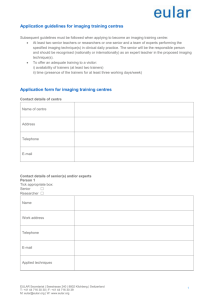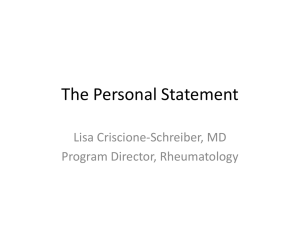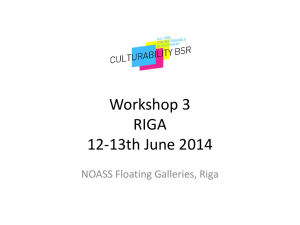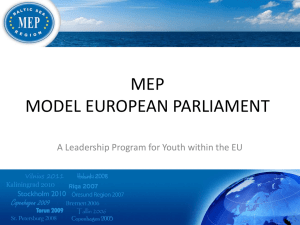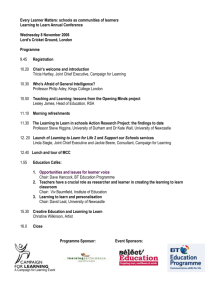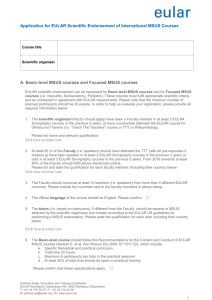eular committees - The British Society for Rheumatology
advertisement
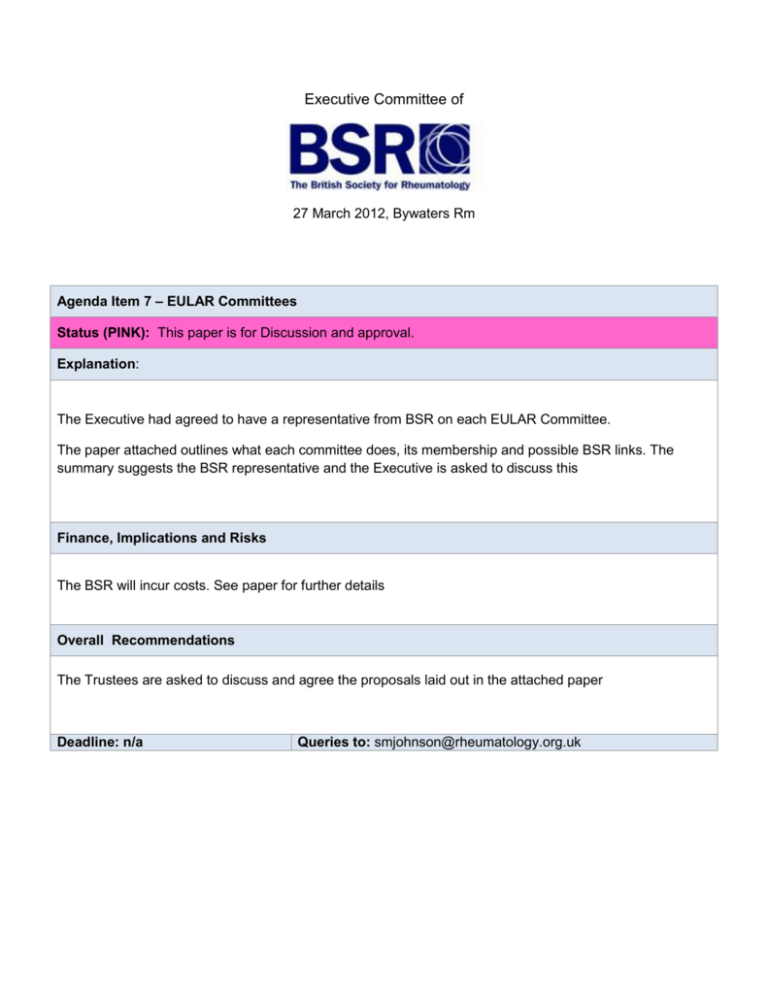
Executive Committee of 27 March 2012, Bywaters Rm Agenda Item 7 – EULAR Committees Status (PINK): This paper is for Discussion and approval. Explanation: The Executive had agreed to have a representative from BSR on each EULAR Committee. The paper attached outlines what each committee does, its membership and possible BSR links. The summary suggests the BSR representative and the Executive is asked to discuss this Finance, Implications and Risks The BSR will incur costs. See paper for further details Overall Recommendations The Trustees are asked to discuss and agree the proposals laid out in the attached paper Deadline: n/a Queries to: smjohnson@rheumatology.org.uk Exec1/2012/Agenda Item 7 EULAR COMMITTEES Additional information on each committee is available on the EULAR website in the About Us section. www.eular.org All committees have delegated members (from member societies) and co-opted members. All committees meet annually at the EULAR Congress. Epidemiology and Health Services Research The standing committee has a number of goals: 1) Contributing towards the epidemiological and health services research content and quality of the Annual Congress, 2) Providing statistics and figures that may be useful to strengthen the role of EULAR in Europe and in the world, 3) Facilitating the tools and the workforce for epidemiological and clinical research, 4) Training rheumatologists in member countries in epidemiological methods both for population and clinical based studies, 5) Undertaking collaborative studies between countries both in developing methodologies for collaborative studies and in collecting data which can address key issues of concern. Chair: Professor Loreto Carmona, Spain Current activities: European Musculoskeletal Conditions Surveillance and Information Network (EUMuscNet) Task Force on Requirements for Observational Treatment Registers EULAR perspectives in patient-reported outcomes EULAR task force on "Long-term extension studies" Potential BSR Link: Chair of Research and Registers Committee UK- based committee members (co-opted): Will Dixon, Gary Macfarlane Suzanne Verstappen Education and Training It is the task of the EULAR Standing Committee on Education and Training (ESCET) to formulate and promote education and training opportunities in rheumatology in Europe. Most of these activities are also open for people from other areas. The committee is responsible for training and educational activities for physicians and rheumatologists, while the tasks pertaining to education and training of allied health professionals and patients are part of the task of their separate standing committees. Chair: Professor Dimitrios Boumpas, Greece Current activities: EMEUNET (Emerging EULAR Network) Annual EULAR congress – advice on educational content and structure 1 Exec1/2012/Agenda Item 7 EULAR On-line Courses EULAR courses EULAR learning tools for undergraduate students and general practitioners Bursaries / Sponsorship Potential BSR Link: Chair of Education and Training Committee UK- based committee members (co-opted): Maya Buch, Michael Doherty, Abhay Joshi, Arumugam Moorthy, Katharina Sokoll, Anthony Woolf, Clinical Affairs The Standing Committee on Clinical Affairs (ESCCA) manages a large and exciting portfolio of projects of primary clinical concern across the spectrum of the rheumatic diseases. The scope of ESCCA funded projects continues to broaden and, in addition to current guideline and recommendation initiatives, will increasingly consider applications to furnish strategic developments. ESCCA receives proposals as a response to periodic strategic calls, but also responds to proposals initiated by investigators. In both cases, a formal peer review process is conducted to assess specific project applications. In the criteria and recommendation field, ESCCA also collaborates with the Guideline Committee and the Quality of Care Committee of the American College of Rheumatology. Outputs from these projects are primarily published in the Annals of Rheumatic Diseases, and Arthritis and Rheumatism. Chair: Dr. Daniel Aletaha, Austria Current activities: Applications for project grants EULAR/ACR Collaborative Projects Specialty Groups Potential BSR Link: Chair of Clinical Affairs UK based committee members (co-opted): Iain McInnes (Past Chair), Investigative Rheumatology The Standing Committee seeks to enhance the knowledge about the genetic, molecular and cellular basis of the rheumatic diseases, aimed at developing better prevention, early detection/diagnosis and treatment for rheumatic diseases. The Standing Committee and its study groups strive to build an international network of excellence by fostering European cooperation and scientific collaborations. In developing a database of the most active research centers in Europe information is provided about current research activities, training and funding possibilities, open positions in experimental rheumatology and research meetings such as the annual European Workshop for Rheumatology Research (EWRR). Specifically, the database shall also serve as basis for attracting fellows in all countries eligible to participate in EU grants. 2 Exec1/2012/Agenda Item 7 Chair-elect: Prof. Georg Schett, Germany Current activities: Database of active research centers in Europe Study groups Potential BSR Link: Either the Chair of Research and Registers, or the Chair of Heberden UK based committee members (co-opted): No co-opted members, delegated members only Paediatric Rheumatology The mission of the Paediatric Standing Committee of EULAR is to improve the care for children with rheumatic diseases in Europe. The Standing Committee of Paediatric Rheumatology consists of elected representatives of National Societies for Paediatric Rheumatology. An ongoing theme is to develop the relationship between EULAR and the Paediatric Rheumatology European Society (PReS), to ensure synergy between the organisations and avoid duplication of effort. The remit of the standing committee covers several areas in paediatric rheumatology, including the clinical care of children and young people with rheumatic disease, education and training in paediatric rheumatology and research in children and young people of relevance to rheumatic diseases across the age spectrum. Chair: Prof. Johannes Roth, Germany Current activities: Clinical care of Children and Young People with Rheumatic Disease Education and training in paediatric rheumatology Research and Knowledge Transfer Potential BSR Link: either ask BSPAR for a nomination via BSR or delegate the BSPAR BSR Council member UK based committee members (co-opted): No co-opted members, delegated members only Musculoskeletal Imaging While conventional radiography has been the historic mainstay of arthritis structural assessment for rheumatologists, the profile of ultrasonography and magnetic resonance imaging has rapidly increased in the last decade. European clinicians have been at the forefront of guiding appropriate utilisation of radiographic and novel imaging techniques. In recent years EULAR had established a Working Party on Imaging in Rheumatology (chaired by Professor Walter Grassi). The EULAR Executive established a new provisional Committee on Musculoskeletal Imaging in 2006, which was elevated to Standing Committee status in October 2007. For musculoskeletal conditions, this committee aims to promote pan-European: 1. Improved patient care through the appropriate use of imaging modalities 2. Education in both the understanding and application of imaging modalities 3. Research in imaging modalities to inform their clinical utility and their use in clinical trials 3 Exec1/2012/Agenda Item 7 Chairman: Prof. Mikkel Østergaard, Denmark Current activities: Imaging in Rheumatology EULAR-OMERACT Rheumatoid Arthritis MRI Reference Image Atlas Potential BSR Link: Ask Chair Heberden to nominate via Exec - Heberden should have some with imaging expertise on their committee UK based committee members (co-opted): No co-opted members, delegated members only. Current project leads include Philip Conaghan and Richard Wakefield Summary The BSR representative on each committee should be linked to the most appropriate committee role within BSR, hence the following: Epidemiology and Health services – Chair of Research and Registers Committee Education and Training - Education and Training Committee Clinical Affairs - Chair of Clinical Affairs Investigative Rheumatology – Either the Chair of Research and Registers, or the Chair of Heberden Paediatric - either ask BSPAR for a nomination via BSR or delegate the BSPAR BSR Council member Musculoskeletal Imaging - Ask Chair Heberden to nominate via Exec - Heberden should have some with imaging expertise on their committee. Financial Implications BSR will incur additional costs in enabling trustees to attend EULAR. Average cost of flights/accommodation plus registration fee: £1200-£1500 per person, depending on conference location. This could add up to £9,000 in expenditure relating to attendance at EULAR. Pro-active role In order that the BSR gets maximum benefit for this additional expenditure it is important that this role is pro-active. As well as formally feeding back to the Executive Committee on a regular basis, to be agreed by the President, the representative should also inform the President and CEO of relevant agenda items in advance as well as pro-actively planning agenda items. Opportunities to publicise work undertaken as part of these committees should be taken where possible to provide the BSR press office and communication function with information. 4
